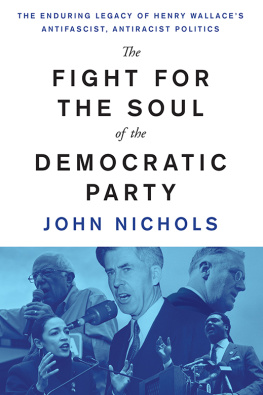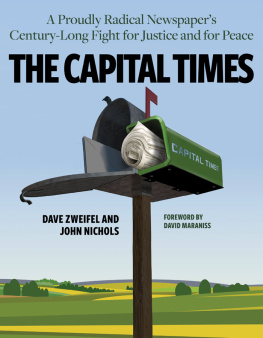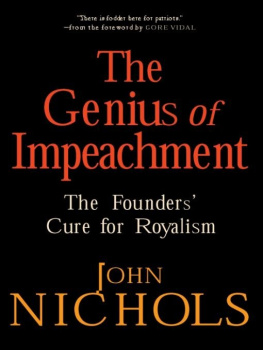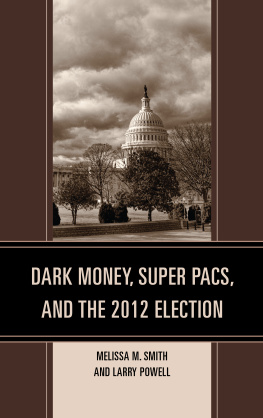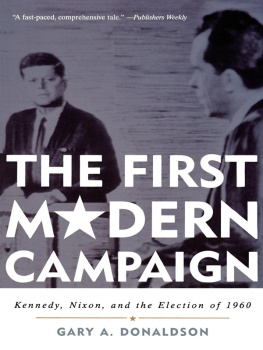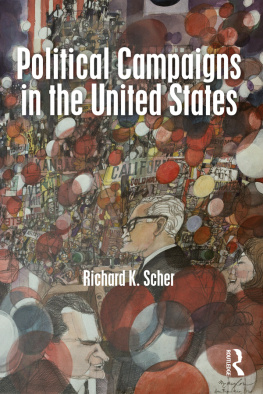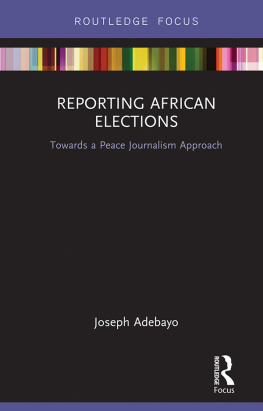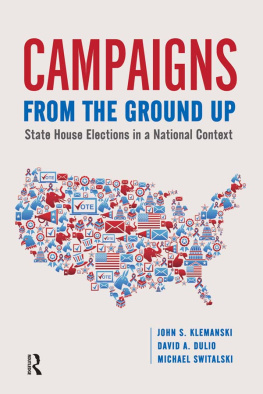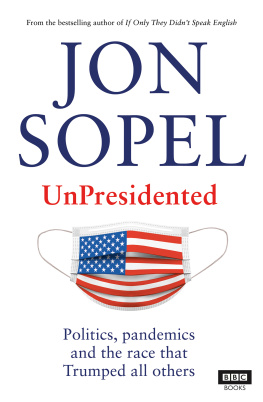DOLLAROCRACY
Also by John Nichols and Robert W. McChesney
Its the Media, Stupid (2000)
Our Media, Not Theirs (2002)
Tragedy and Farce: How the American Media Sell Wars, Spin Elections, and Destroy Democracy (2005)
The Death and Life of American Journalism: The Media Revolution That Will Begin the World Again (2010)
DOLLAROCRACY
How the Money-and-Media Election
Complex Is Destroying America
JOHN NICHOLS
AND ROBERT W. McCHESNEY

Copyright 2013 by John Nichols and Robert W. McChesney
Published by
Nation Books, A Member of the Perseus Books Group
116 East 16th Street, 8th Floor
New York, NY 10003
Nation Books is a co-publishing venture of the Nation Institute and the Perseus Books Group.
All rights reserved. No part of this book may be reproduced in any manner whatsoever without written permission except in the case of brief quotations embodied in critical articles and reviews. For information, address the Perseus Books Group, 250 West 57th Street, 15th Floor, New York, NY 10107.
Books published by Nation Books are available at special discounts for bulk purchases in the United States by corporations, institutions, and other organizations. For more information, please contact the Special Markets Department at the Perseus Books Group, 2300 Chestnut Street, Suite 200, Philadelphia, PA 19103, or call (800) 255-1514, or e-mail .
Designed by Pauline Brown
A CIP catalog record for this book is available from the Library of Congress
ISBN: 978-1-56858-711-0 (e-book)
10 9 8 7 6 5 4 3 2 1
For Whitman, Amy, and Lucy
I speak the password primeval,
I give the sign of democracy;
By God! I will accept nothing which all cannot have their counterpart of on the same terms.
WALT WHITMAN, SONG OF MYSELF
CONTENTS
M ore than a decade ago, in April 2002, I opened a crowded meeting at the Unitarian Church on Main Street in Montpelier, Vermont, by announcing, I want to welcome you to what I believe is the first congressional town meeting ever organized to address the issue of corporate control of the media. For the next several hours, John Nichols, Bob McChesney, and I had the remarkable experience of talking with and listening to citizens who were ready to engage in a serious discourse about the role of a free press in sustaining democracy. The people got it, as they almost always do. Even then, they could see what we saw: a decline in the amount and quality of journalism and a parallel rise in the influence of Big Money in our politics.
The media reform movement that Nichols and McChesney have done so much to fosteras the authors of four books on media policy, as advocates for independent media, and as cofounders of the nations media reform network, Free Presshas always sought to address that concern. Ive been proud to work with them on media issues and proud of the successes we have had in pushing back against consolidation of media ownership and in supporting public and community broadcasting and maintaining net neutrality.
But Nichols and McChesney have always argued that realizing the full promise of a free press in America must be seen as the founders saw it: as a way of providing the information and ideas that sustain democratic discourse and enable citizens to cast informed votes. And the past decade has, unfortunately, been rough on democratic discourse and on democracy itself. Local newspapers have closed or been downsized. Coverage of statehouses and even of Washington, DC, is declining. Although there is hope for online journalism, resources are few. For tens of millions of Americans, an information void has developed. And it is being filled by political advertising and public relations spin.
The simple truth is that we cannot govern our own affairs when our national, state, and local debates are bought and sold by billionaires, who use thirty-second commercials to shout down anyone who disagrees. Democracy demands a rich, robust discourse about ideas, not a spending spree that demeans those ideas, diminishes honest debate, and turns voters off to the political process. Yet this is the threat we now face. In this book, Nichols and McChesney, pioneers in explaining the relationship between media and democracy, step up to address the great challenge of our time: the replacement of democracy with what they describe as Dollarocracy.
This is not a casually chosen term. They suggest that with the decline of independent journalism as a primary source of information about elections and governing, and its replacement by now-omnipresent political advertising, especially since the Supreme Courts Citizens United v. FEC ruling, we have seen the development of an electoral equivalent to the self-perpetuating military-industrial complex that Dwight Eisenhower warned us about. The money-and-media election complex, producing a slurry of negative ads, spin, and obstruction, is not what the founders intended.
Thats one reason that I was proud to introduce a Saving American Democracy amendment to the U.S. Constitution that says corporations are not persons with constitutional rights equal to real people, corporations are subject to regulation by the people, corporations may not make campaign contributions or any election expenditures, and Congress and the states have the power to regulate campaign finances. In this book, Nichols and McChesney make a powerful case for why it is necessary to amend the Constitution to tackle the Money Power that the Progressive reformers of a century ago warned would replace democracy with plutocracy.
But they do not stop there. They recall the Progressive Era and argue that America is ripe for a new age of reform that focuses on renewing democracy and that takes as its foundational premise an understanding that the essential act of democracy, voting, must be protected and made meaningful by legislation, statutes, and amendments. Nichols and McChesney are not doctrinaire; they recognize that many reforms can and should be entertained and that not every American will agree on every proposal. But, they argue, the energy that has been seen in popular protests on behalf of labor rights; in campaigns to defend public education and public services; in the movements to save Social Security, Medicare, and Medicaid; in the Occupy movements challenge to income inequality; and in the town meetings of my home state of Vermont, which have called for amending the Constitution to address corporate abuses of the political process constitutes evidence of a rising call for reforms that will allow American democracy to work for all Americans, not just a privileged and powerful few.
This is an exciting prospect and one with deep roots in American history. The wisest of the founders recognized that America would evolve and change with time, and they rested great power in the people to assure that the evolution might serve the common good. With this book, John Nichols and Bob McChesney invite Americans to examine in new ways the challenges facing America and to fully recognize the threat that the combination of Big Money and big media poses to the promise of self-government. They paint a daunting picture, rich in detail based on intense reporting and groundbreaking research. But they do not offer us a pessimistic take. Rather, they call us, as Tom Paine did more than two centuries ago, to turn knowledge into power. And they tell us that we can and must respond to our contemporary challenges as a nation by rejecting Dollarocracy and renewing our commitment to democracy.
Next page

